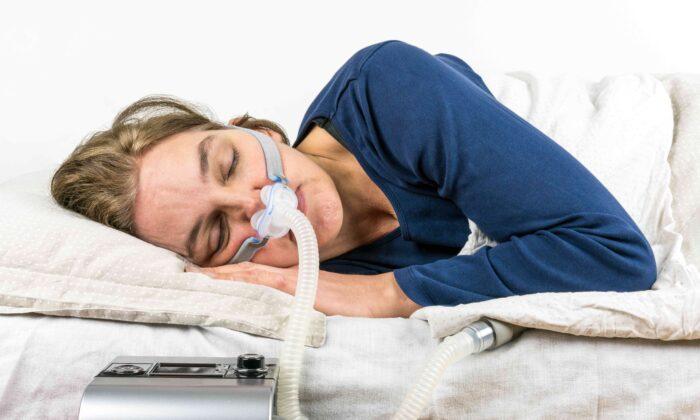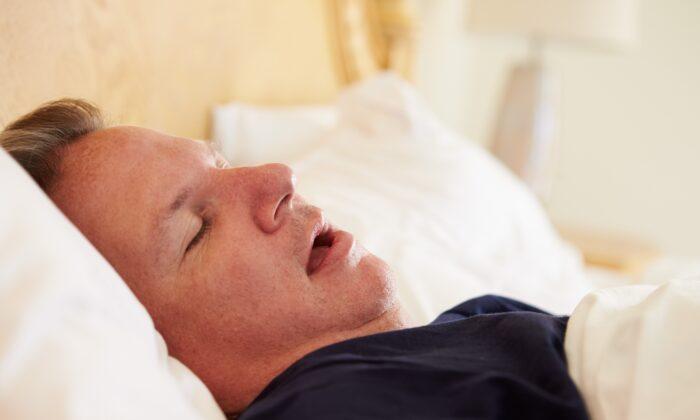Sleep is a very big deal. Yet, despite fantastic scientific and technological achievements in the 21st century, extraordinary advances in the field of sleep medicine are largely unknown, ignored, or discounted by the vast majority of health care professionals.
Nowhere is this vacuum in clinical sleep knowledge more evident than in the treatment of mental health patients, who frequently complain about and struggle with sleep disorders.
Many suffering from mental health problems like anxiety, depression, or post-traumatic stress disorder (PTSD), as well as those with suicidal thoughts or behaviors, almost invariably agonize over co-existing diagnosable and treatable sleep disorders. Rarely are these conditions examined or understood through the lens of modern sleep medicine.
Instead, individuals wrestling with mental health and sleep disorders are instructed—sometimes for years—to believe in only two approaches to sleep complaints. Foremost, their physicians and therapists—with sincere intentions—explain how sleep problems should vanish once mental health is restored. In other words, mental disease affects sleep, so first, attack the cause by fixing the mental health.
Or, they are prescribed every imaginable sedating medication found in the “Physicians’ Desk Reference.” Often, mental health patients hear both theories and are persuaded to take prescription or over-the-counter drugs until the mental condition resolves.
Not only are these theories wrong in 90 percent of those diagnosed with mental health disorders and co-existing sleep symptoms—they may be dead wrong for those unfortunate souls whose sleep disorders proved far more incapacitating than anyone was able to recognize and properly treat.
That’s why sleep is such a big deal when it comes to your mental health. The great news is three decades of research prove how your sleep problems are independent from your mental health conditions and therefore can and must be treated independently.
Now, here’s the unbelievable irony: Most mental health patients already know this truth about sleep. In contrast, few health care professionals have been listening to this advice. Instead, mental health patients cast around for expert sleep health assessments and treatments beyond pills, because they recognize better sleep would yield better mental health.
History will show patients led the way as they appreciated intuitively and from experience this meaningful clinical pearl, which, regrettably, took health care professionals and researchers decades to unravel in scientific fashion.
These facts have been repeatedly demonstrated for conditions such as anxiety, depression, and PTSD—and to some extent for suicidal thoughts or behaviors. This information should be a welcoming update, spread all over, so mental health patients can finally get the sleep treatments they need. To be precise—potent, evidence-based, independent interventions (largely drug-free) for sleep disorders will improve these mental health complaints and sometimes cure them.
The puzzling question, for now, is the backstory: How could so many health care professionals, in so many different clinical branches of medicine and psychology over the past three decades, overlook all this scientific evidence?
The answer may surprise you. These well-intentioned professionals were following the conventional wisdom alleging sleep is about the number of hours slept and its corollary the number of hours slept without interruption (sleep continuity).
This outdated theory regarding quantity of sleep has been supplanted by the biologically more relevant theory of “quality of sleep.” Pause for a moment and ask yourself—how many times in your life have you heard, “quality over quantity” is what really counts?
Sleep is no exception. Most health care professionals are only looking at sleep quantity or continuity based on the mistaken assumption that counting hours or continuous hours is the essential piece driving sleep disturbances. As they are accustomed to treating those with difficulties falling asleep or staying asleep—namely insomnia—it seems to make perfect sense to focus on sleep hours. The catch is, nearly all insomniacs also suffer nonrestorative sleep—aka poor sleep quality—which typically proves more pivotal in fueling the insomnia.
Nonetheless, the insomnia angle is just one of two factors misdirecting health care professionals to rank quantity over quality. The far greater problem is the implicit and explicit biases claiming sleep disturbances in mental health patients are exclusively driven by psychological factors. While this “it’s-all-in-your-mind” approach is close to the target, it still misses the mark by a mile for a large, unsuspected, and very physical reason.
It just so happens your mind resides in your brain, and your brain is where sleep is most observable. How can we observe sleep in the brain? Easy—your brain generates specific, physiologically-driven, electrical impulses that measure the depth and quality of slumber. From this bit of knowledge, it is imperative to appreciate that everything about your sleep includes this physiological (physical) dimension, which means no one could accurately declare your sleep problems as strictly psychological.
Indisputably, the measurement of sleep is analogous to measuring electrical impulses from your heart. Rarely would someone’s heart arrhythmia be caused only by psychological factors. Why would we ever imagine sleep problems must be caused exclusively by psychological considerations?
Much more awaits you as we dig deeper into sleep physiology—what you learn next will enhance your appreciation for sleep’s huge impact on your health. Have you ever heard or read about deadly conditions such as kidney or liver failure in which major organ systems fail to remove toxic waste matter from your body? When complete failure occurs, the toxic waste build-up causes death.
This brings us to “brain failure,” a condition conjuring up head trauma, severe strokes, or comas. Fortunately, brain failure associated with sleep is much more gradual, though it can lead to deadly consequences because the brain also must remove toxic waste matter. And, you’ll never guess when the brain is most active and effective in eliminating this toxicity.
If you guessed “sleeping,” you’d be on the right track, but it’s not just any sleep. It’s deep sleep. The deeper you sleep, the better your “brain-washing” system works. This point comes full circle because gaining deeper slumber requires attaining the highest possible quality of sleep.
Now you know, counting hours of sleep is often as useless as counting sheep. As we shepherd you towards new and exciting possibilities to teach you how to improve your sleep quality and thereby improve brain health and mental health, we’ll start with proven practical advice on how you can learn to measure your own sleep quality.
Please sleep on these points for they just might save your life.





